Business Law Report: UK Legal System and Business Impact
VerifiedAdded on 2021/01/02
|16
|5515
|467
Report
AI Summary
This business law report provides a comprehensive overview of the UK legal system and its impact on various aspects of business operations. The report begins with an analysis of the concept of parliamentary sovereignty and the sources of UK law, including common law, legislation, and European Union law. It examines the roles of the government and the justice court in law-making, differentiating between statutory and common law. Furthermore, the report delves into the impacts of contract law, employment law, and company law on the business sector. The second section focuses on the types and formation of different business organizations, comparing the advantages and disadvantages of unincorporated and incorporated businesses. Finally, the report analyzes several case studies involving business disputes, offering legal solutions and recommendations, and exploring the use of alternative dispute resolution methods. The report aims to provide a solid understanding of UK business law and its practical implications.
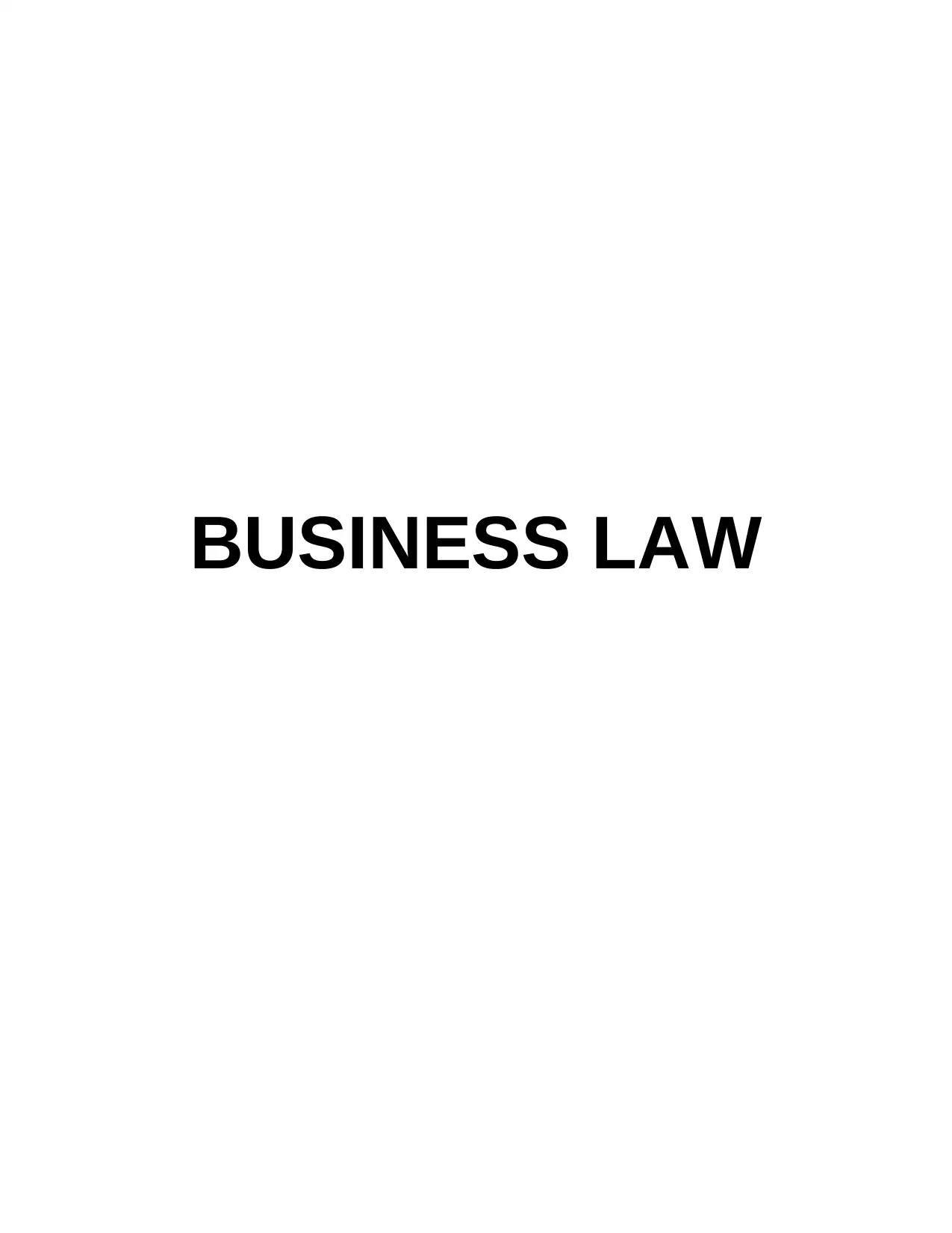
BUSINESS LAW
Paraphrase This Document
Need a fresh take? Get an instant paraphrase of this document with our AI Paraphraser
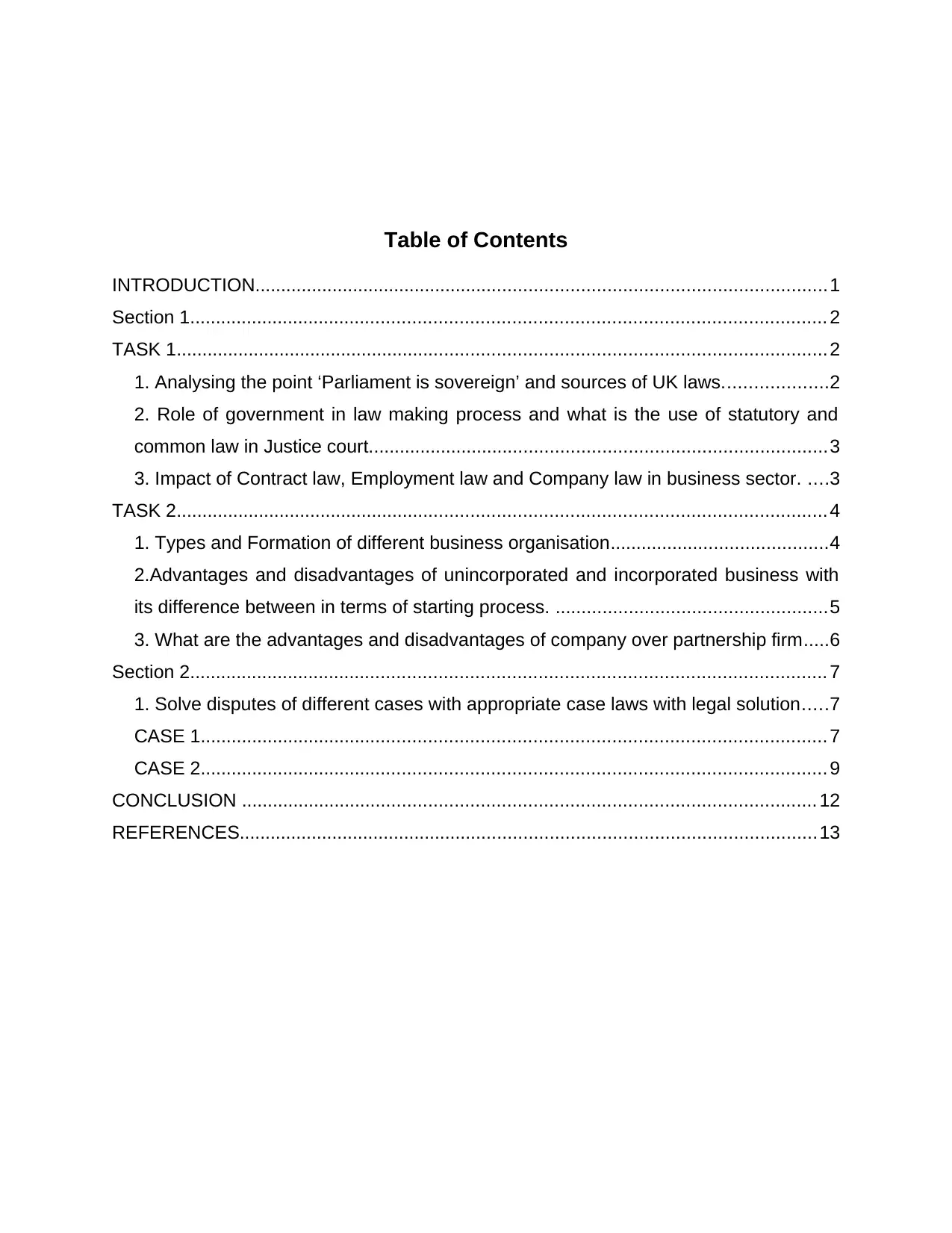
Table of Contents
INTRODUCTION..............................................................................................................1
Section 1.......................................................................................................................... 2
TASK 1.............................................................................................................................2
1. Analysing the point ‘Parliament is sovereign’ and sources of UK laws....................2
2. Role of government in law making process and what is the use of statutory and
common law in Justice court........................................................................................3
3. Impact of Contract law, Employment law and Company law in business sector. ....3
TASK 2.............................................................................................................................4
1. Types and Formation of different business organisation..........................................4
2.Advantages and disadvantages of unincorporated and incorporated business with
its difference between in terms of starting process. ....................................................5
3. What are the advantages and disadvantages of company over partnership firm.....6
Section 2.......................................................................................................................... 7
1. Solve disputes of different cases with appropriate case laws with legal solution.....7
CASE 1........................................................................................................................ 7
CASE 2........................................................................................................................ 9
CONCLUSION .............................................................................................................. 12
REFERENCES...............................................................................................................13
INTRODUCTION..............................................................................................................1
Section 1.......................................................................................................................... 2
TASK 1.............................................................................................................................2
1. Analysing the point ‘Parliament is sovereign’ and sources of UK laws....................2
2. Role of government in law making process and what is the use of statutory and
common law in Justice court........................................................................................3
3. Impact of Contract law, Employment law and Company law in business sector. ....3
TASK 2.............................................................................................................................4
1. Types and Formation of different business organisation..........................................4
2.Advantages and disadvantages of unincorporated and incorporated business with
its difference between in terms of starting process. ....................................................5
3. What are the advantages and disadvantages of company over partnership firm.....6
Section 2.......................................................................................................................... 7
1. Solve disputes of different cases with appropriate case laws with legal solution.....7
CASE 1........................................................................................................................ 7
CASE 2........................................................................................................................ 9
CONCLUSION .............................................................................................................. 12
REFERENCES...............................................................................................................13
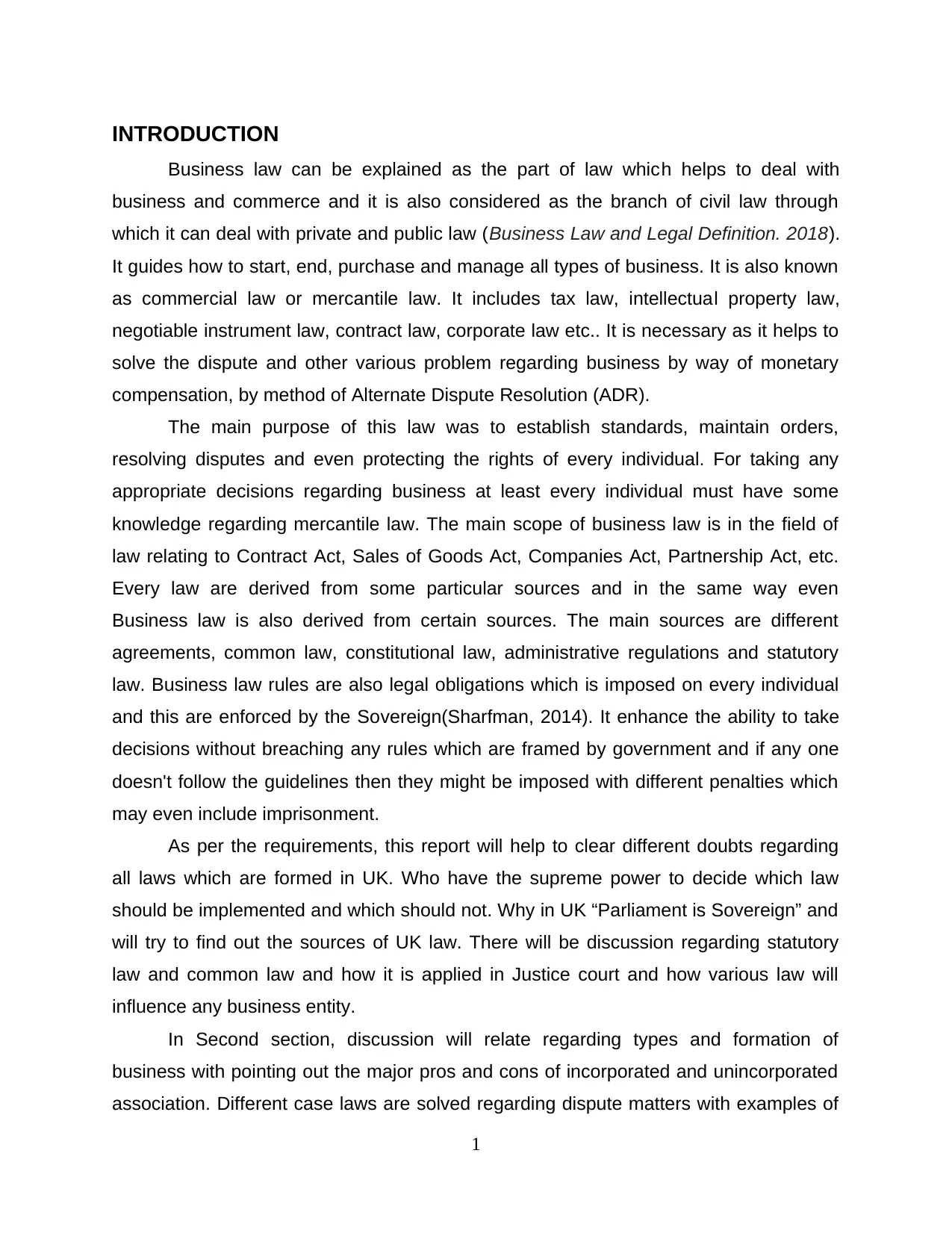
INTRODUCTION
Business law can be explained as the part of law which helps to deal with
business and commerce and it is also considered as the branch of civil law through
which it can deal with private and public law (Business Law and Legal Definition. 2018).
It guides how to start, end, purchase and manage all types of business. It is also known
as commercial law or mercantile law. It includes tax law, intellectual property law,
negotiable instrument law, contract law, corporate law etc.. It is necessary as it helps to
solve the dispute and other various problem regarding business by way of monetary
compensation, by method of Alternate Dispute Resolution (ADR).
The main purpose of this law was to establish standards, maintain orders,
resolving disputes and even protecting the rights of every individual. For taking any
appropriate decisions regarding business at least every individual must have some
knowledge regarding mercantile law. The main scope of business law is in the field of
law relating to Contract Act, Sales of Goods Act, Companies Act, Partnership Act, etc.
Every law are derived from some particular sources and in the same way even
Business law is also derived from certain sources. The main sources are different
agreements, common law, constitutional law, administrative regulations and statutory
law. Business law rules are also legal obligations which is imposed on every individual
and this are enforced by the Sovereign(Sharfman, 2014). It enhance the ability to take
decisions without breaching any rules which are framed by government and if any one
doesn't follow the guidelines then they might be imposed with different penalties which
may even include imprisonment.
As per the requirements, this report will help to clear different doubts regarding
all laws which are formed in UK. Who have the supreme power to decide which law
should be implemented and which should not. Why in UK “Parliament is Sovereign” and
will try to find out the sources of UK law. There will be discussion regarding statutory
law and common law and how it is applied in Justice court and how various law will
influence any business entity.
In Second section, discussion will relate regarding types and formation of
business with pointing out the major pros and cons of incorporated and unincorporated
association. Different case laws are solved regarding dispute matters with examples of
1
Business law can be explained as the part of law which helps to deal with
business and commerce and it is also considered as the branch of civil law through
which it can deal with private and public law (Business Law and Legal Definition. 2018).
It guides how to start, end, purchase and manage all types of business. It is also known
as commercial law or mercantile law. It includes tax law, intellectual property law,
negotiable instrument law, contract law, corporate law etc.. It is necessary as it helps to
solve the dispute and other various problem regarding business by way of monetary
compensation, by method of Alternate Dispute Resolution (ADR).
The main purpose of this law was to establish standards, maintain orders,
resolving disputes and even protecting the rights of every individual. For taking any
appropriate decisions regarding business at least every individual must have some
knowledge regarding mercantile law. The main scope of business law is in the field of
law relating to Contract Act, Sales of Goods Act, Companies Act, Partnership Act, etc.
Every law are derived from some particular sources and in the same way even
Business law is also derived from certain sources. The main sources are different
agreements, common law, constitutional law, administrative regulations and statutory
law. Business law rules are also legal obligations which is imposed on every individual
and this are enforced by the Sovereign(Sharfman, 2014). It enhance the ability to take
decisions without breaching any rules which are framed by government and if any one
doesn't follow the guidelines then they might be imposed with different penalties which
may even include imprisonment.
As per the requirements, this report will help to clear different doubts regarding
all laws which are formed in UK. Who have the supreme power to decide which law
should be implemented and which should not. Why in UK “Parliament is Sovereign” and
will try to find out the sources of UK law. There will be discussion regarding statutory
law and common law and how it is applied in Justice court and how various law will
influence any business entity.
In Second section, discussion will relate regarding types and formation of
business with pointing out the major pros and cons of incorporated and unincorporated
association. Different case laws are solved regarding dispute matters with examples of
1
⊘ This is a preview!⊘
Do you want full access?
Subscribe today to unlock all pages.

Trusted by 1+ million students worldwide
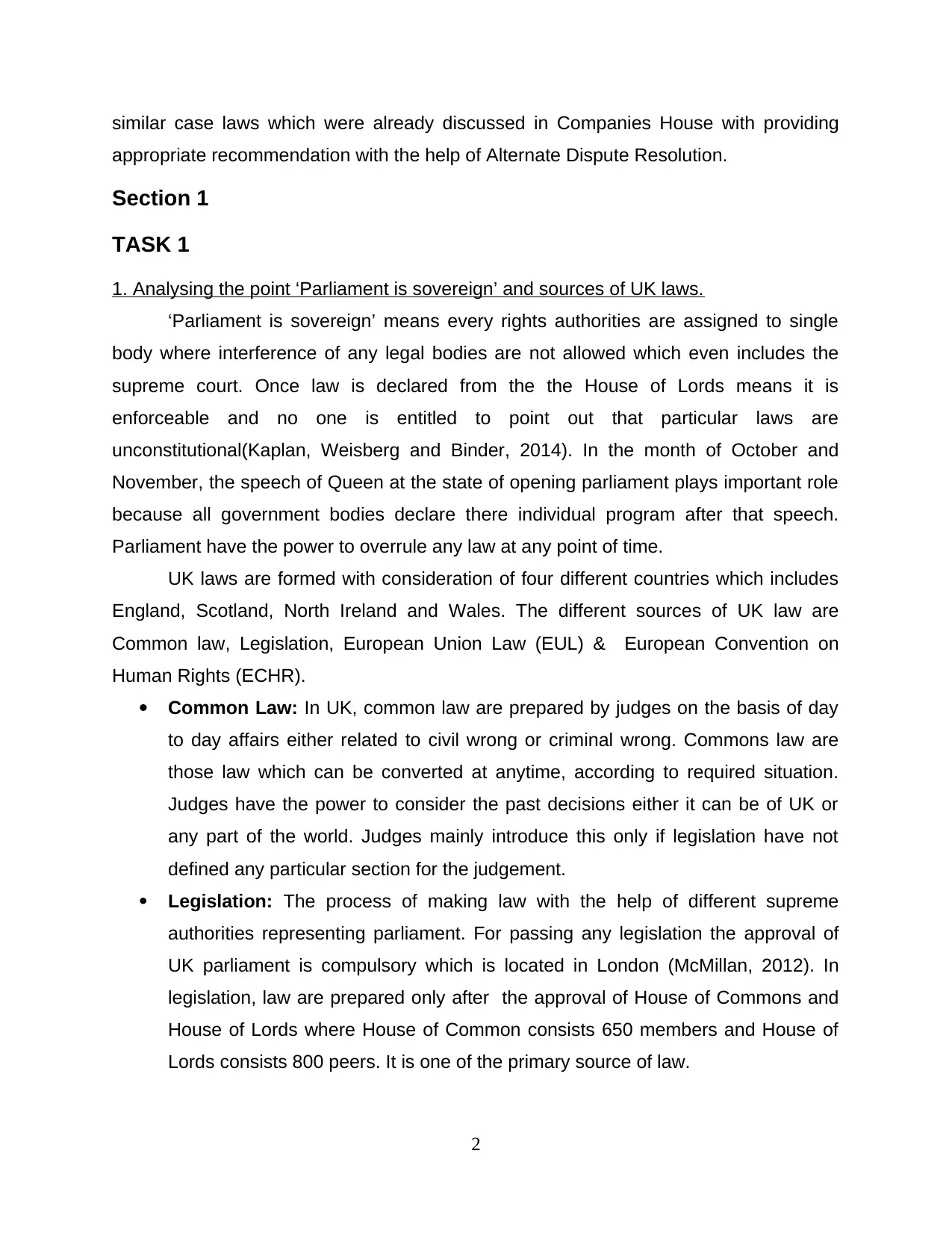
similar case laws which were already discussed in Companies House with providing
appropriate recommendation with the help of Alternate Dispute Resolution.
Section 1
TASK 1
1. Analysing the point ‘Parliament is sovereign’ and sources of UK laws.
‘Parliament is sovereign’ means every rights authorities are assigned to single
body where interference of any legal bodies are not allowed which even includes the
supreme court. Once law is declared from the the House of Lords means it is
enforceable and no one is entitled to point out that particular laws are
unconstitutional(Kaplan, Weisberg and Binder, 2014). In the month of October and
November, the speech of Queen at the state of opening parliament plays important role
because all government bodies declare there individual program after that speech.
Parliament have the power to overrule any law at any point of time.
UK laws are formed with consideration of four different countries which includes
England, Scotland, North Ireland and Wales. The different sources of UK law are
Common law, Legislation, European Union Law (EUL) & European Convention on
Human Rights (ECHR).
Common Law: In UK, common law are prepared by judges on the basis of day
to day affairs either related to civil wrong or criminal wrong. Commons law are
those law which can be converted at anytime, according to required situation.
Judges have the power to consider the past decisions either it can be of UK or
any part of the world. Judges mainly introduce this only if legislation have not
defined any particular section for the judgement.
Legislation: The process of making law with the help of different supreme
authorities representing parliament. For passing any legislation the approval of
UK parliament is compulsory which is located in London (McMillan, 2012). In
legislation, law are prepared only after the approval of House of Commons and
House of Lords where House of Common consists 650 members and House of
Lords consists 800 peers. It is one of the primary source of law.
2
appropriate recommendation with the help of Alternate Dispute Resolution.
Section 1
TASK 1
1. Analysing the point ‘Parliament is sovereign’ and sources of UK laws.
‘Parliament is sovereign’ means every rights authorities are assigned to single
body where interference of any legal bodies are not allowed which even includes the
supreme court. Once law is declared from the the House of Lords means it is
enforceable and no one is entitled to point out that particular laws are
unconstitutional(Kaplan, Weisberg and Binder, 2014). In the month of October and
November, the speech of Queen at the state of opening parliament plays important role
because all government bodies declare there individual program after that speech.
Parliament have the power to overrule any law at any point of time.
UK laws are formed with consideration of four different countries which includes
England, Scotland, North Ireland and Wales. The different sources of UK law are
Common law, Legislation, European Union Law (EUL) & European Convention on
Human Rights (ECHR).
Common Law: In UK, common law are prepared by judges on the basis of day
to day affairs either related to civil wrong or criminal wrong. Commons law are
those law which can be converted at anytime, according to required situation.
Judges have the power to consider the past decisions either it can be of UK or
any part of the world. Judges mainly introduce this only if legislation have not
defined any particular section for the judgement.
Legislation: The process of making law with the help of different supreme
authorities representing parliament. For passing any legislation the approval of
UK parliament is compulsory which is located in London (McMillan, 2012). In
legislation, law are prepared only after the approval of House of Commons and
House of Lords where House of Common consists 650 members and House of
Lords consists 800 peers. It is one of the primary source of law.
2
Paraphrase This Document
Need a fresh take? Get an instant paraphrase of this document with our AI Paraphraser
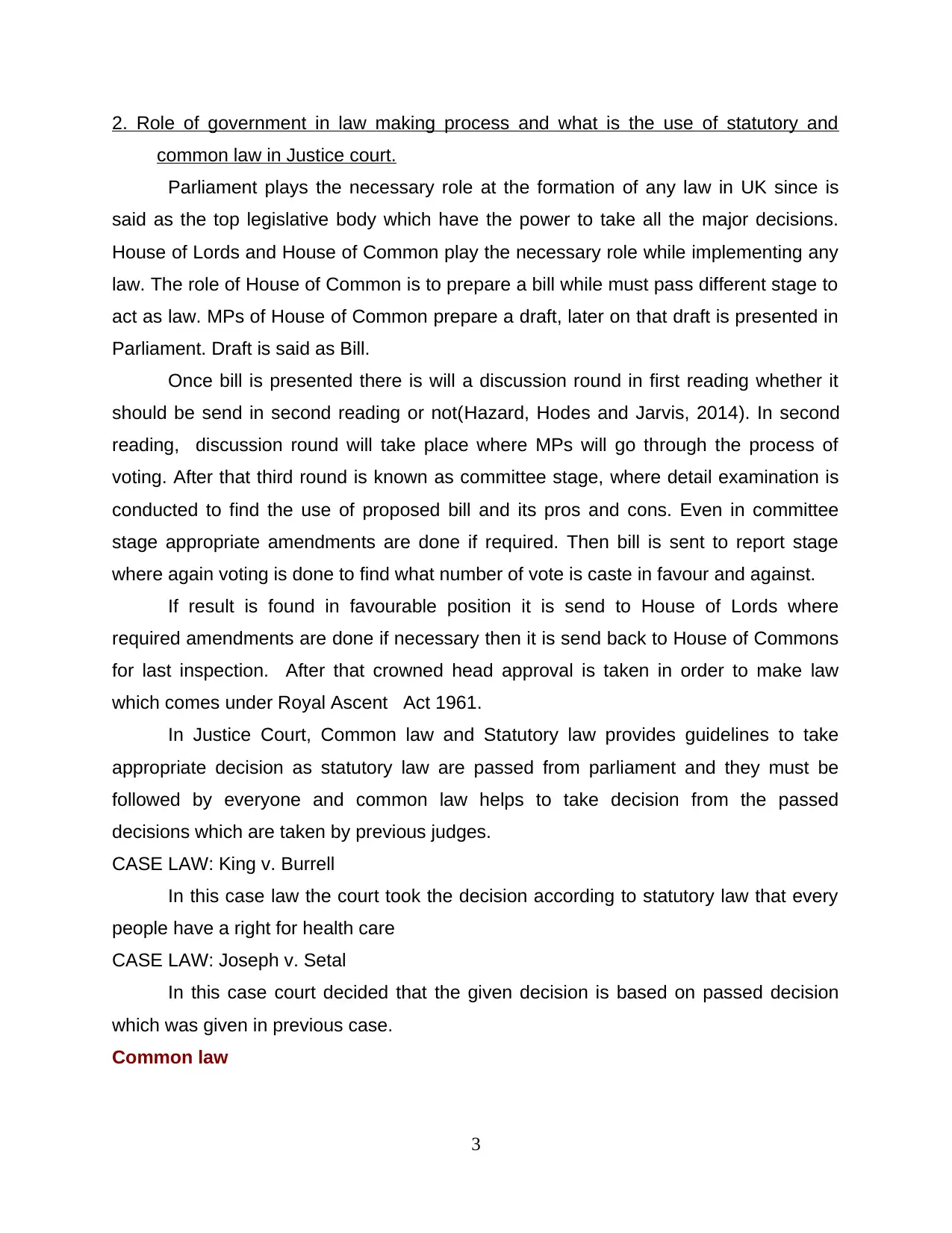
2. Role of government in law making process and what is the use of statutory and
common law in Justice court.
Parliament plays the necessary role at the formation of any law in UK since is
said as the top legislative body which have the power to take all the major decisions.
House of Lords and House of Common play the necessary role while implementing any
law. The role of House of Common is to prepare a bill while must pass different stage to
act as law. MPs of House of Common prepare a draft, later on that draft is presented in
Parliament. Draft is said as Bill.
Once bill is presented there is will a discussion round in first reading whether it
should be send in second reading or not(Hazard, Hodes and Jarvis, 2014). In second
reading, discussion round will take place where MPs will go through the process of
voting. After that third round is known as committee stage, where detail examination is
conducted to find the use of proposed bill and its pros and cons. Even in committee
stage appropriate amendments are done if required. Then bill is sent to report stage
where again voting is done to find what number of vote is caste in favour and against.
If result is found in favourable position it is send to House of Lords where
required amendments are done if necessary then it is send back to House of Commons
for last inspection. After that crowned head approval is taken in order to make law
which comes under Royal Ascent Act 1961.
In Justice Court, Common law and Statutory law provides guidelines to take
appropriate decision as statutory law are passed from parliament and they must be
followed by everyone and common law helps to take decision from the passed
decisions which are taken by previous judges.
CASE LAW: King v. Burrell
In this case law the court took the decision according to statutory law that every
people have a right for health care
CASE LAW: Joseph v. Setal
In this case court decided that the given decision is based on passed decision
which was given in previous case.
Common law
3
common law in Justice court.
Parliament plays the necessary role at the formation of any law in UK since is
said as the top legislative body which have the power to take all the major decisions.
House of Lords and House of Common play the necessary role while implementing any
law. The role of House of Common is to prepare a bill while must pass different stage to
act as law. MPs of House of Common prepare a draft, later on that draft is presented in
Parliament. Draft is said as Bill.
Once bill is presented there is will a discussion round in first reading whether it
should be send in second reading or not(Hazard, Hodes and Jarvis, 2014). In second
reading, discussion round will take place where MPs will go through the process of
voting. After that third round is known as committee stage, where detail examination is
conducted to find the use of proposed bill and its pros and cons. Even in committee
stage appropriate amendments are done if required. Then bill is sent to report stage
where again voting is done to find what number of vote is caste in favour and against.
If result is found in favourable position it is send to House of Lords where
required amendments are done if necessary then it is send back to House of Commons
for last inspection. After that crowned head approval is taken in order to make law
which comes under Royal Ascent Act 1961.
In Justice Court, Common law and Statutory law provides guidelines to take
appropriate decision as statutory law are passed from parliament and they must be
followed by everyone and common law helps to take decision from the passed
decisions which are taken by previous judges.
CASE LAW: King v. Burrell
In this case law the court took the decision according to statutory law that every
people have a right for health care
CASE LAW: Joseph v. Setal
In this case court decided that the given decision is based on passed decision
which was given in previous case.
Common law
3
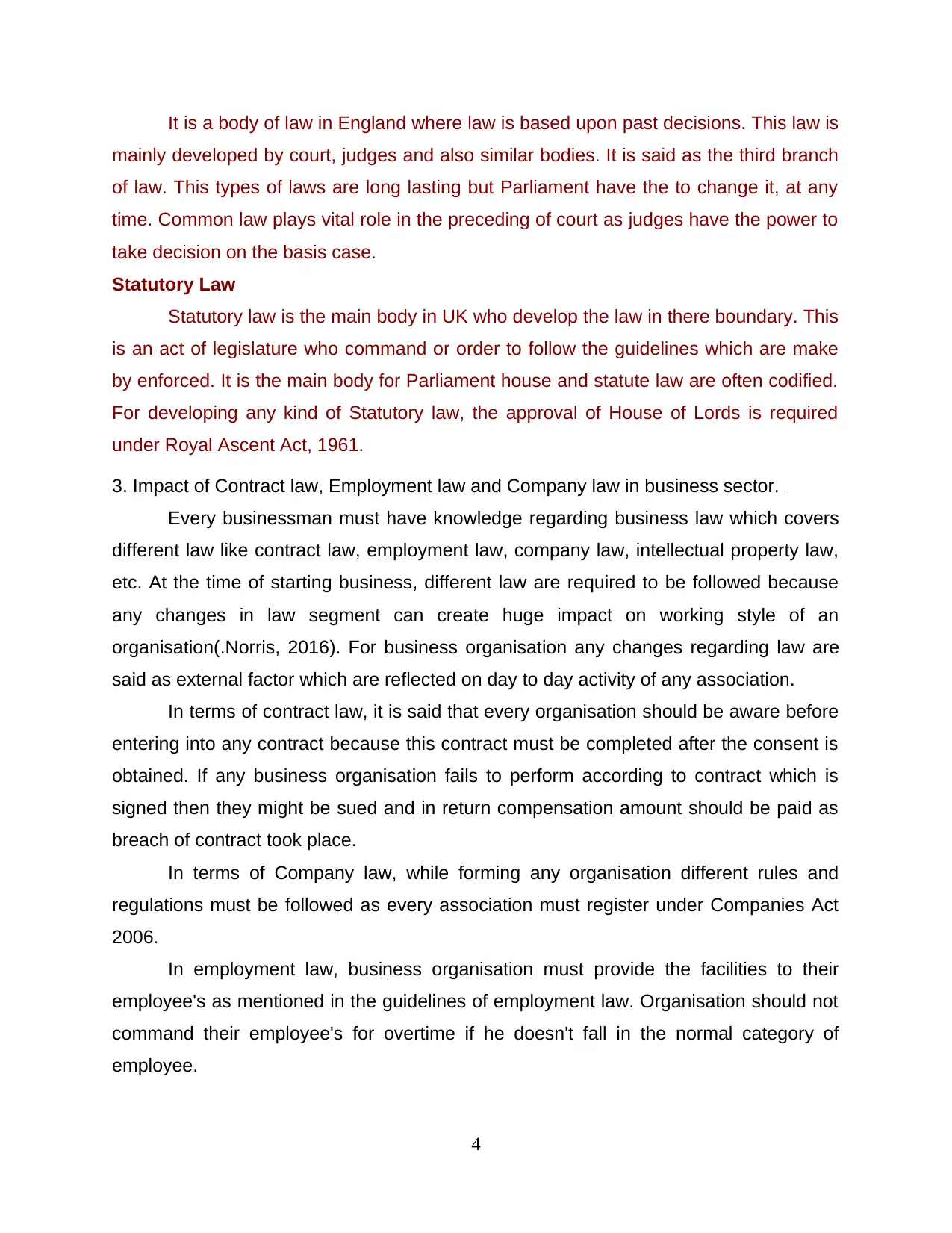
It is a body of law in England where law is based upon past decisions. This law is
mainly developed by court, judges and also similar bodies. It is said as the third branch
of law. This types of laws are long lasting but Parliament have the to change it, at any
time. Common law plays vital role in the preceding of court as judges have the power to
take decision on the basis case.
Statutory Law
Statutory law is the main body in UK who develop the law in there boundary. This
is an act of legislature who command or order to follow the guidelines which are make
by enforced. It is the main body for Parliament house and statute law are often codified.
For developing any kind of Statutory law, the approval of House of Lords is required
under Royal Ascent Act, 1961.
3. Impact of Contract law, Employment law and Company law in business sector.
Every businessman must have knowledge regarding business law which covers
different law like contract law, employment law, company law, intellectual property law,
etc. At the time of starting business, different law are required to be followed because
any changes in law segment can create huge impact on working style of an
organisation(.Norris, 2016). For business organisation any changes regarding law are
said as external factor which are reflected on day to day activity of any association.
In terms of contract law, it is said that every organisation should be aware before
entering into any contract because this contract must be completed after the consent is
obtained. If any business organisation fails to perform according to contract which is
signed then they might be sued and in return compensation amount should be paid as
breach of contract took place.
In terms of Company law, while forming any organisation different rules and
regulations must be followed as every association must register under Companies Act
2006.
In employment law, business organisation must provide the facilities to their
employee's as mentioned in the guidelines of employment law. Organisation should not
command their employee's for overtime if he doesn't fall in the normal category of
employee.
4
mainly developed by court, judges and also similar bodies. It is said as the third branch
of law. This types of laws are long lasting but Parliament have the to change it, at any
time. Common law plays vital role in the preceding of court as judges have the power to
take decision on the basis case.
Statutory Law
Statutory law is the main body in UK who develop the law in there boundary. This
is an act of legislature who command or order to follow the guidelines which are make
by enforced. It is the main body for Parliament house and statute law are often codified.
For developing any kind of Statutory law, the approval of House of Lords is required
under Royal Ascent Act, 1961.
3. Impact of Contract law, Employment law and Company law in business sector.
Every businessman must have knowledge regarding business law which covers
different law like contract law, employment law, company law, intellectual property law,
etc. At the time of starting business, different law are required to be followed because
any changes in law segment can create huge impact on working style of an
organisation(.Norris, 2016). For business organisation any changes regarding law are
said as external factor which are reflected on day to day activity of any association.
In terms of contract law, it is said that every organisation should be aware before
entering into any contract because this contract must be completed after the consent is
obtained. If any business organisation fails to perform according to contract which is
signed then they might be sued and in return compensation amount should be paid as
breach of contract took place.
In terms of Company law, while forming any organisation different rules and
regulations must be followed as every association must register under Companies Act
2006.
In employment law, business organisation must provide the facilities to their
employee's as mentioned in the guidelines of employment law. Organisation should not
command their employee's for overtime if he doesn't fall in the normal category of
employee.
4
⊘ This is a preview!⊘
Do you want full access?
Subscribe today to unlock all pages.

Trusted by 1+ million students worldwide
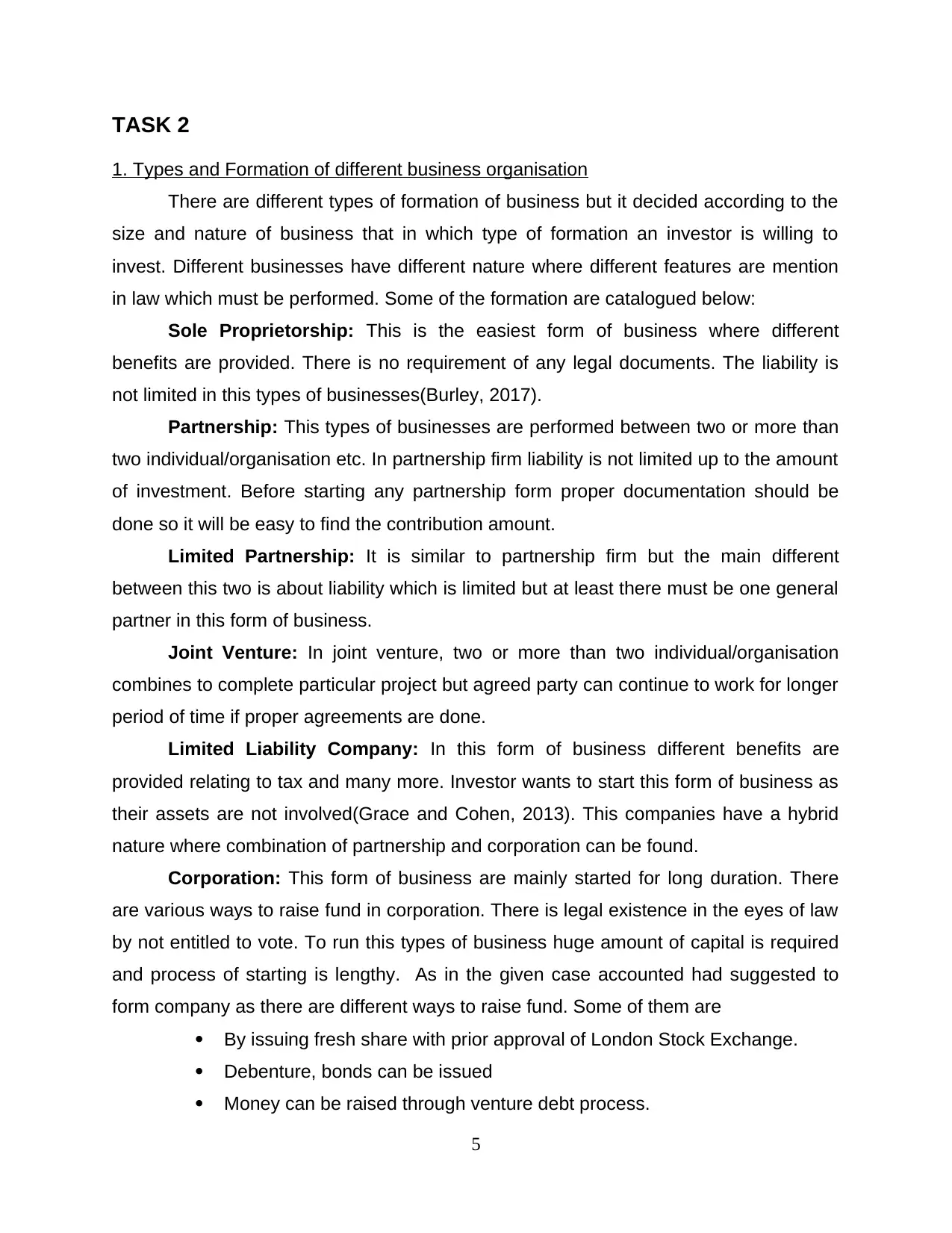
TASK 2
1. Types and Formation of different business organisation
There are different types of formation of business but it decided according to the
size and nature of business that in which type of formation an investor is willing to
invest. Different businesses have different nature where different features are mention
in law which must be performed. Some of the formation are catalogued below:
Sole Proprietorship: This is the easiest form of business where different
benefits are provided. There is no requirement of any legal documents. The liability is
not limited in this types of businesses(Burley, 2017).
Partnership: This types of businesses are performed between two or more than
two individual/organisation etc. In partnership firm liability is not limited up to the amount
of investment. Before starting any partnership form proper documentation should be
done so it will be easy to find the contribution amount.
Limited Partnership: It is similar to partnership firm but the main different
between this two is about liability which is limited but at least there must be one general
partner in this form of business.
Joint Venture: In joint venture, two or more than two individual/organisation
combines to complete particular project but agreed party can continue to work for longer
period of time if proper agreements are done.
Limited Liability Company: In this form of business different benefits are
provided relating to tax and many more. Investor wants to start this form of business as
their assets are not involved(Grace and Cohen, 2013). This companies have a hybrid
nature where combination of partnership and corporation can be found.
Corporation: This form of business are mainly started for long duration. There
are various ways to raise fund in corporation. There is legal existence in the eyes of law
by not entitled to vote. To run this types of business huge amount of capital is required
and process of starting is lengthy. As in the given case accounted had suggested to
form company as there are different ways to raise fund. Some of them are
By issuing fresh share with prior approval of London Stock Exchange.
Debenture, bonds can be issued
Money can be raised through venture debt process.
5
1. Types and Formation of different business organisation
There are different types of formation of business but it decided according to the
size and nature of business that in which type of formation an investor is willing to
invest. Different businesses have different nature where different features are mention
in law which must be performed. Some of the formation are catalogued below:
Sole Proprietorship: This is the easiest form of business where different
benefits are provided. There is no requirement of any legal documents. The liability is
not limited in this types of businesses(Burley, 2017).
Partnership: This types of businesses are performed between two or more than
two individual/organisation etc. In partnership firm liability is not limited up to the amount
of investment. Before starting any partnership form proper documentation should be
done so it will be easy to find the contribution amount.
Limited Partnership: It is similar to partnership firm but the main different
between this two is about liability which is limited but at least there must be one general
partner in this form of business.
Joint Venture: In joint venture, two or more than two individual/organisation
combines to complete particular project but agreed party can continue to work for longer
period of time if proper agreements are done.
Limited Liability Company: In this form of business different benefits are
provided relating to tax and many more. Investor wants to start this form of business as
their assets are not involved(Grace and Cohen, 2013). This companies have a hybrid
nature where combination of partnership and corporation can be found.
Corporation: This form of business are mainly started for long duration. There
are various ways to raise fund in corporation. There is legal existence in the eyes of law
by not entitled to vote. To run this types of business huge amount of capital is required
and process of starting is lengthy. As in the given case accounted had suggested to
form company as there are different ways to raise fund. Some of them are
By issuing fresh share with prior approval of London Stock Exchange.
Debenture, bonds can be issued
Money can be raised through venture debt process.
5
Paraphrase This Document
Need a fresh take? Get an instant paraphrase of this document with our AI Paraphraser
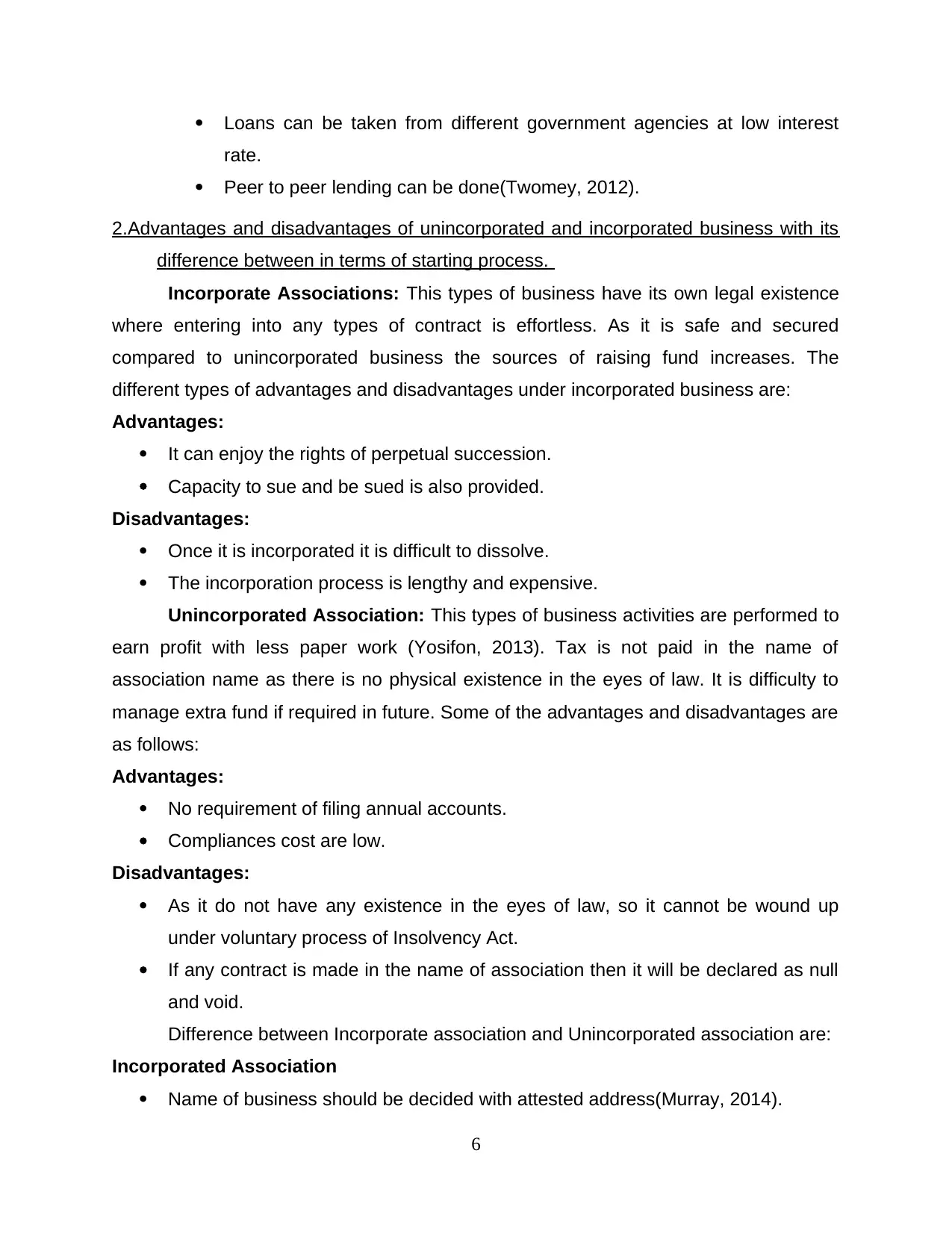
Loans can be taken from different government agencies at low interest
rate.
Peer to peer lending can be done(Twomey, 2012).
2.Advantages and disadvantages of unincorporated and incorporated business with its
difference between in terms of starting process.
Incorporate Associations: This types of business have its own legal existence
where entering into any types of contract is effortless. As it is safe and secured
compared to unincorporated business the sources of raising fund increases. The
different types of advantages and disadvantages under incorporated business are:
Advantages:
It can enjoy the rights of perpetual succession.
Capacity to sue and be sued is also provided.
Disadvantages:
Once it is incorporated it is difficult to dissolve.
The incorporation process is lengthy and expensive.
Unincorporated Association: This types of business activities are performed to
earn profit with less paper work (Yosifon, 2013). Tax is not paid in the name of
association name as there is no physical existence in the eyes of law. It is difficulty to
manage extra fund if required in future. Some of the advantages and disadvantages are
as follows:
Advantages:
No requirement of filing annual accounts.
Compliances cost are low.
Disadvantages:
As it do not have any existence in the eyes of law, so it cannot be wound up
under voluntary process of Insolvency Act.
If any contract is made in the name of association then it will be declared as null
and void.
Difference between Incorporate association and Unincorporated association are:
Incorporated Association
Name of business should be decided with attested address(Murray, 2014).
6
rate.
Peer to peer lending can be done(Twomey, 2012).
2.Advantages and disadvantages of unincorporated and incorporated business with its
difference between in terms of starting process.
Incorporate Associations: This types of business have its own legal existence
where entering into any types of contract is effortless. As it is safe and secured
compared to unincorporated business the sources of raising fund increases. The
different types of advantages and disadvantages under incorporated business are:
Advantages:
It can enjoy the rights of perpetual succession.
Capacity to sue and be sued is also provided.
Disadvantages:
Once it is incorporated it is difficult to dissolve.
The incorporation process is lengthy and expensive.
Unincorporated Association: This types of business activities are performed to
earn profit with less paper work (Yosifon, 2013). Tax is not paid in the name of
association name as there is no physical existence in the eyes of law. It is difficulty to
manage extra fund if required in future. Some of the advantages and disadvantages are
as follows:
Advantages:
No requirement of filing annual accounts.
Compliances cost are low.
Disadvantages:
As it do not have any existence in the eyes of law, so it cannot be wound up
under voluntary process of Insolvency Act.
If any contract is made in the name of association then it will be declared as null
and void.
Difference between Incorporate association and Unincorporated association are:
Incorporated Association
Name of business should be decided with attested address(Murray, 2014).
6
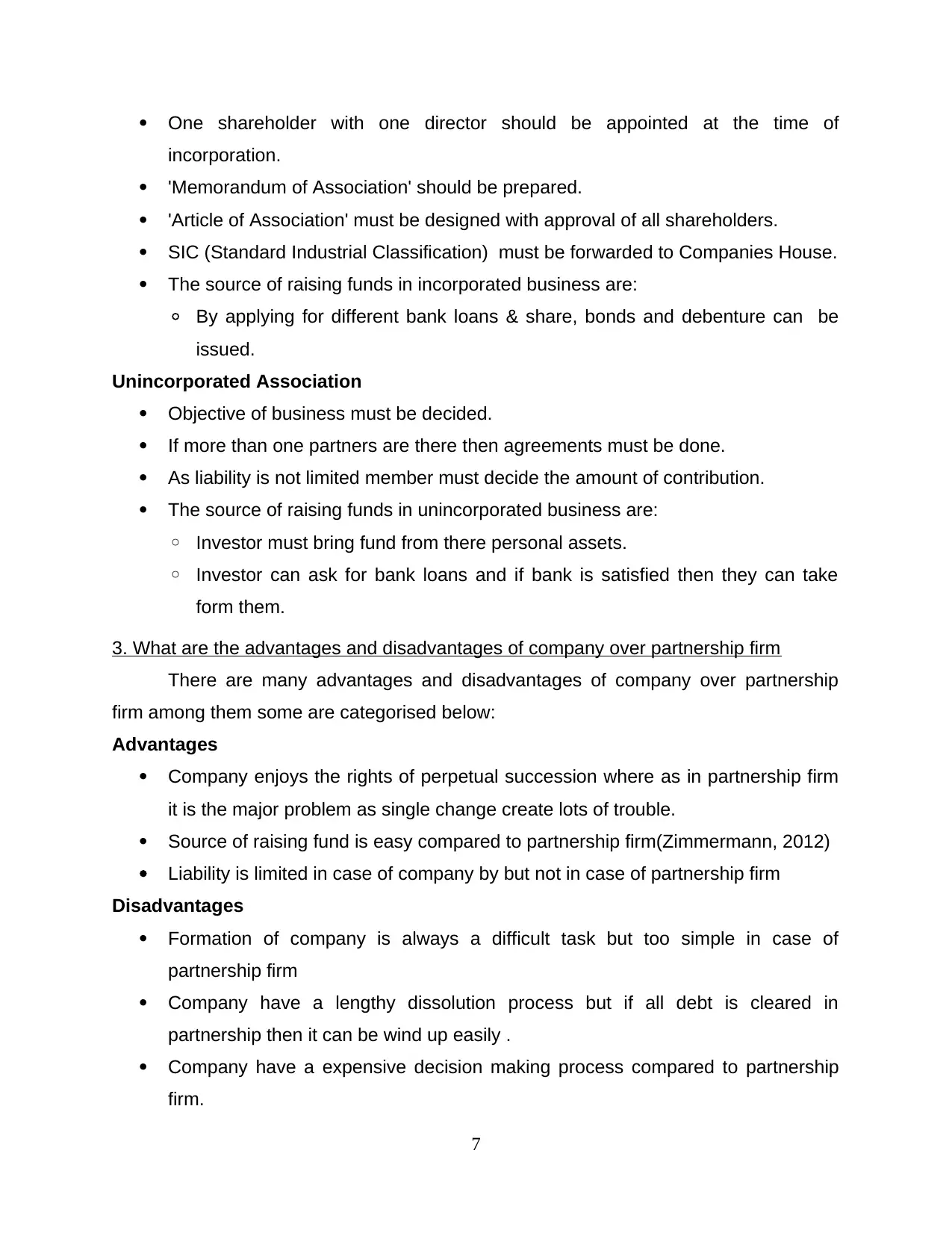
One shareholder with one director should be appointed at the time of
incorporation.
'Memorandum of Association' should be prepared.
'Article of Association' must be designed with approval of all shareholders.
SIC (Standard Industrial Classification) must be forwarded to Companies House.
The source of raising funds in incorporated business are:
◦ By applying for different bank loans & share, bonds and debenture can be
issued.
Unincorporated Association
Objective of business must be decided.
If more than one partners are there then agreements must be done.
As liability is not limited member must decide the amount of contribution.
The source of raising funds in unincorporated business are:
◦ Investor must bring fund from there personal assets.
◦ Investor can ask for bank loans and if bank is satisfied then they can take
form them.
3. What are the advantages and disadvantages of company over partnership firm
There are many advantages and disadvantages of company over partnership
firm among them some are categorised below:
Advantages
Company enjoys the rights of perpetual succession where as in partnership firm
it is the major problem as single change create lots of trouble.
Source of raising fund is easy compared to partnership firm(Zimmermann, 2012)
Liability is limited in case of company by but not in case of partnership firm
Disadvantages
Formation of company is always a difficult task but too simple in case of
partnership firm
Company have a lengthy dissolution process but if all debt is cleared in
partnership then it can be wind up easily .
Company have a expensive decision making process compared to partnership
firm.
7
incorporation.
'Memorandum of Association' should be prepared.
'Article of Association' must be designed with approval of all shareholders.
SIC (Standard Industrial Classification) must be forwarded to Companies House.
The source of raising funds in incorporated business are:
◦ By applying for different bank loans & share, bonds and debenture can be
issued.
Unincorporated Association
Objective of business must be decided.
If more than one partners are there then agreements must be done.
As liability is not limited member must decide the amount of contribution.
The source of raising funds in unincorporated business are:
◦ Investor must bring fund from there personal assets.
◦ Investor can ask for bank loans and if bank is satisfied then they can take
form them.
3. What are the advantages and disadvantages of company over partnership firm
There are many advantages and disadvantages of company over partnership
firm among them some are categorised below:
Advantages
Company enjoys the rights of perpetual succession where as in partnership firm
it is the major problem as single change create lots of trouble.
Source of raising fund is easy compared to partnership firm(Zimmermann, 2012)
Liability is limited in case of company by but not in case of partnership firm
Disadvantages
Formation of company is always a difficult task but too simple in case of
partnership firm
Company have a lengthy dissolution process but if all debt is cleared in
partnership then it can be wind up easily .
Company have a expensive decision making process compared to partnership
firm.
7
⊘ This is a preview!⊘
Do you want full access?
Subscribe today to unlock all pages.

Trusted by 1+ million students worldwide
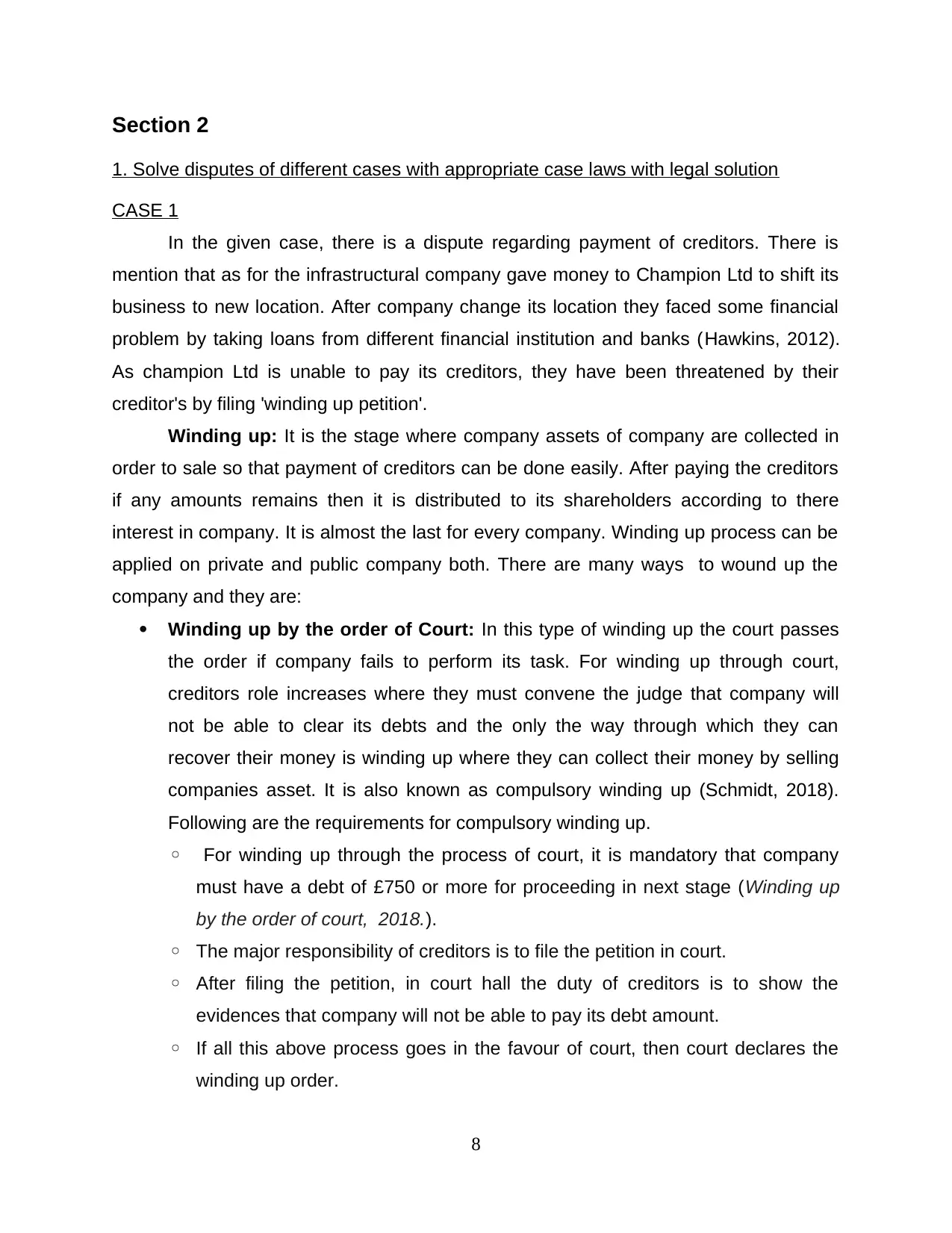
Section 2
1. Solve disputes of different cases with appropriate case laws with legal solution
CASE 1
In the given case, there is a dispute regarding payment of creditors. There is
mention that as for the infrastructural company gave money to Champion Ltd to shift its
business to new location. After company change its location they faced some financial
problem by taking loans from different financial institution and banks (Hawkins, 2012).
As champion Ltd is unable to pay its creditors, they have been threatened by their
creditor's by filing 'winding up petition'.
Winding up: It is the stage where company assets of company are collected in
order to sale so that payment of creditors can be done easily. After paying the creditors
if any amounts remains then it is distributed to its shareholders according to there
interest in company. It is almost the last for every company. Winding up process can be
applied on private and public company both. There are many ways to wound up the
company and they are:
Winding up by the order of Court: In this type of winding up the court passes
the order if company fails to perform its task. For winding up through court,
creditors role increases where they must convene the judge that company will
not be able to clear its debts and the only the way through which they can
recover their money is winding up where they can collect their money by selling
companies asset. It is also known as compulsory winding up (Schmidt, 2018).
Following are the requirements for compulsory winding up.
◦ For winding up through the process of court, it is mandatory that company
must have a debt of £750 or more for proceeding in next stage (Winding up
by the order of court, 2018.).
◦ The major responsibility of creditors is to file the petition in court.
◦ After filing the petition, in court hall the duty of creditors is to show the
evidences that company will not be able to pay its debt amount.
◦ If all this above process goes in the favour of court, then court declares the
winding up order.
8
1. Solve disputes of different cases with appropriate case laws with legal solution
CASE 1
In the given case, there is a dispute regarding payment of creditors. There is
mention that as for the infrastructural company gave money to Champion Ltd to shift its
business to new location. After company change its location they faced some financial
problem by taking loans from different financial institution and banks (Hawkins, 2012).
As champion Ltd is unable to pay its creditors, they have been threatened by their
creditor's by filing 'winding up petition'.
Winding up: It is the stage where company assets of company are collected in
order to sale so that payment of creditors can be done easily. After paying the creditors
if any amounts remains then it is distributed to its shareholders according to there
interest in company. It is almost the last for every company. Winding up process can be
applied on private and public company both. There are many ways to wound up the
company and they are:
Winding up by the order of Court: In this type of winding up the court passes
the order if company fails to perform its task. For winding up through court,
creditors role increases where they must convene the judge that company will
not be able to clear its debts and the only the way through which they can
recover their money is winding up where they can collect their money by selling
companies asset. It is also known as compulsory winding up (Schmidt, 2018).
Following are the requirements for compulsory winding up.
◦ For winding up through the process of court, it is mandatory that company
must have a debt of £750 or more for proceeding in next stage (Winding up
by the order of court, 2018.).
◦ The major responsibility of creditors is to file the petition in court.
◦ After filing the petition, in court hall the duty of creditors is to show the
evidences that company will not be able to pay its debt amount.
◦ If all this above process goes in the favour of court, then court declares the
winding up order.
8
Paraphrase This Document
Need a fresh take? Get an instant paraphrase of this document with our AI Paraphraser
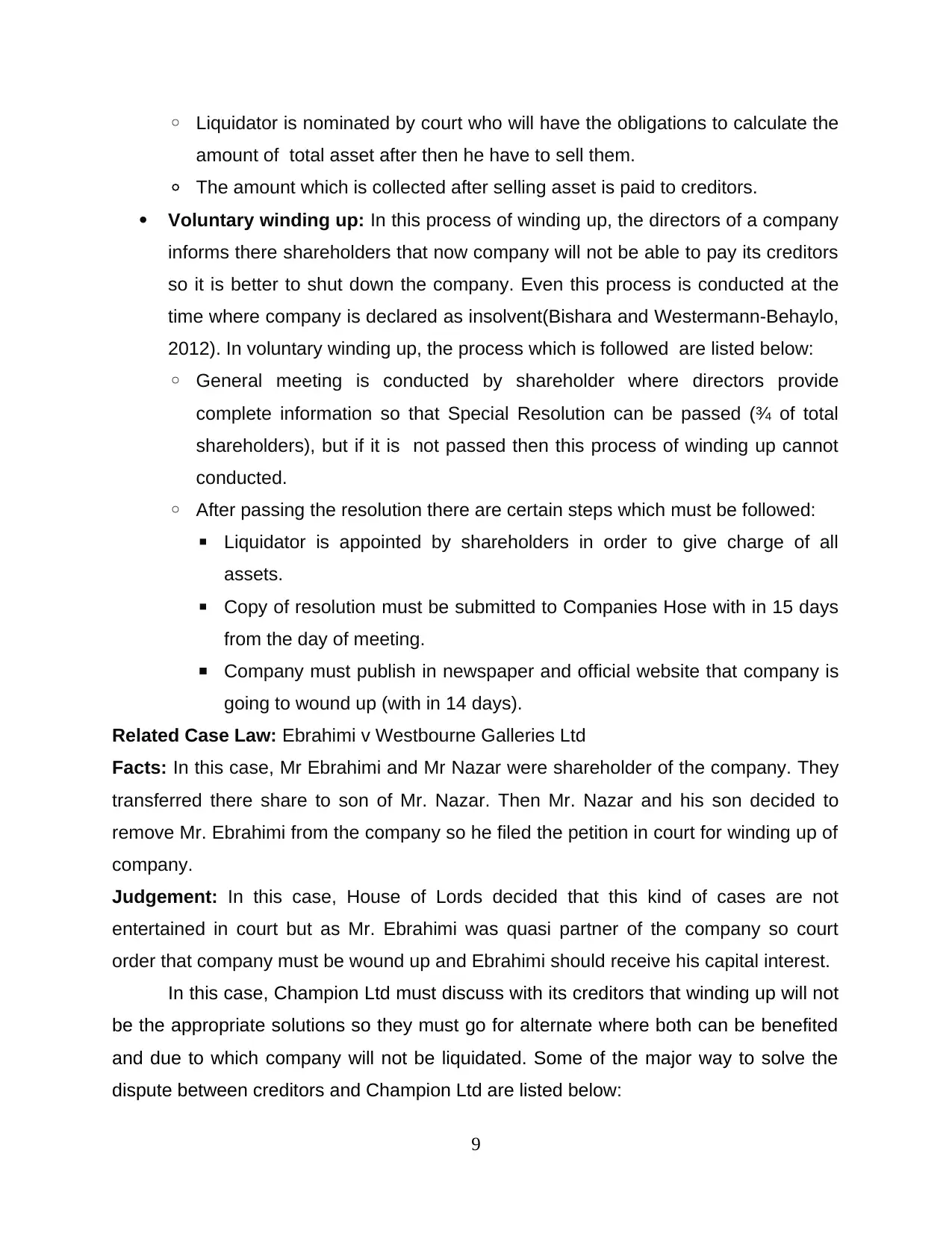
◦ Liquidator is nominated by court who will have the obligations to calculate the
amount of total asset after then he have to sell them.
◦ The amount which is collected after selling asset is paid to creditors.
Voluntary winding up: In this process of winding up, the directors of a company
informs there shareholders that now company will not be able to pay its creditors
so it is better to shut down the company. Even this process is conducted at the
time where company is declared as insolvent(Bishara and Westermann‐Behaylo,
2012). In voluntary winding up, the process which is followed are listed below:
◦ General meeting is conducted by shareholder where directors provide
complete information so that Special Resolution can be passed (¾ of total
shareholders), but if it is not passed then this process of winding up cannot
conducted.
◦ After passing the resolution there are certain steps which must be followed:
▪ Liquidator is appointed by shareholders in order to give charge of all
assets.
▪ Copy of resolution must be submitted to Companies Hose with in 15 days
from the day of meeting.
▪ Company must publish in newspaper and official website that company is
going to wound up (with in 14 days).
Related Case Law: Ebrahimi v Westbourne Galleries Ltd
Facts: In this case, Mr Ebrahimi and Mr Nazar were shareholder of the company. They
transferred there share to son of Mr. Nazar. Then Mr. Nazar and his son decided to
remove Mr. Ebrahimi from the company so he filed the petition in court for winding up of
company.
Judgement: In this case, House of Lords decided that this kind of cases are not
entertained in court but as Mr. Ebrahimi was quasi partner of the company so court
order that company must be wound up and Ebrahimi should receive his capital interest.
In this case, Champion Ltd must discuss with its creditors that winding up will not
be the appropriate solutions so they must go for alternate where both can be benefited
and due to which company will not be liquidated. Some of the major way to solve the
dispute between creditors and Champion Ltd are listed below:
9
amount of total asset after then he have to sell them.
◦ The amount which is collected after selling asset is paid to creditors.
Voluntary winding up: In this process of winding up, the directors of a company
informs there shareholders that now company will not be able to pay its creditors
so it is better to shut down the company. Even this process is conducted at the
time where company is declared as insolvent(Bishara and Westermann‐Behaylo,
2012). In voluntary winding up, the process which is followed are listed below:
◦ General meeting is conducted by shareholder where directors provide
complete information so that Special Resolution can be passed (¾ of total
shareholders), but if it is not passed then this process of winding up cannot
conducted.
◦ After passing the resolution there are certain steps which must be followed:
▪ Liquidator is appointed by shareholders in order to give charge of all
assets.
▪ Copy of resolution must be submitted to Companies Hose with in 15 days
from the day of meeting.
▪ Company must publish in newspaper and official website that company is
going to wound up (with in 14 days).
Related Case Law: Ebrahimi v Westbourne Galleries Ltd
Facts: In this case, Mr Ebrahimi and Mr Nazar were shareholder of the company. They
transferred there share to son of Mr. Nazar. Then Mr. Nazar and his son decided to
remove Mr. Ebrahimi from the company so he filed the petition in court for winding up of
company.
Judgement: In this case, House of Lords decided that this kind of cases are not
entertained in court but as Mr. Ebrahimi was quasi partner of the company so court
order that company must be wound up and Ebrahimi should receive his capital interest.
In this case, Champion Ltd must discuss with its creditors that winding up will not
be the appropriate solutions so they must go for alternate where both can be benefited
and due to which company will not be liquidated. Some of the major way to solve the
dispute between creditors and Champion Ltd are listed below:
9
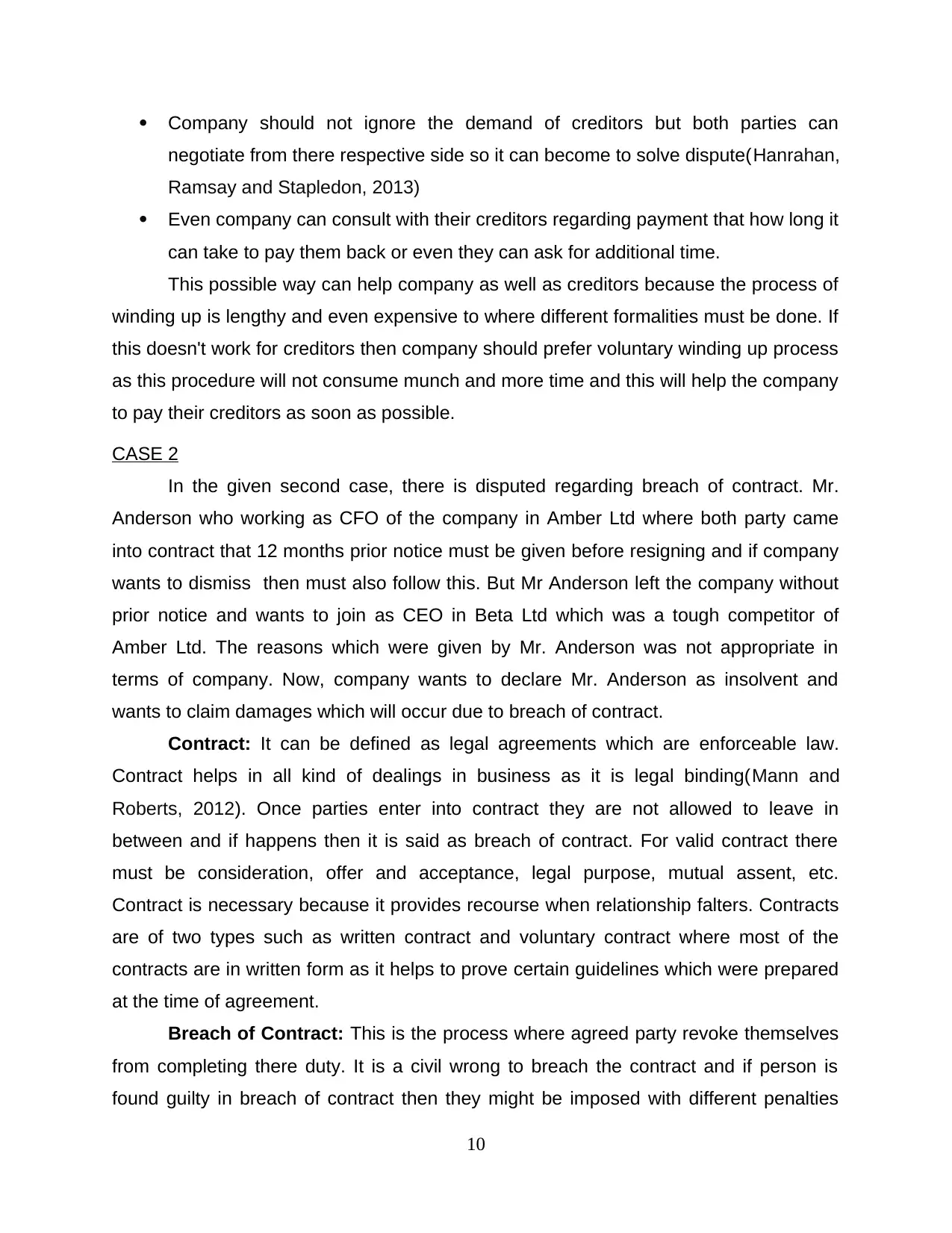
Company should not ignore the demand of creditors but both parties can
negotiate from there respective side so it can become to solve dispute(Hanrahan,
Ramsay and Stapledon, 2013)
Even company can consult with their creditors regarding payment that how long it
can take to pay them back or even they can ask for additional time.
This possible way can help company as well as creditors because the process of
winding up is lengthy and even expensive to where different formalities must be done. If
this doesn't work for creditors then company should prefer voluntary winding up process
as this procedure will not consume munch and more time and this will help the company
to pay their creditors as soon as possible.
CASE 2
In the given second case, there is disputed regarding breach of contract. Mr.
Anderson who working as CFO of the company in Amber Ltd where both party came
into contract that 12 months prior notice must be given before resigning and if company
wants to dismiss then must also follow this. But Mr Anderson left the company without
prior notice and wants to join as CEO in Beta Ltd which was a tough competitor of
Amber Ltd. The reasons which were given by Mr. Anderson was not appropriate in
terms of company. Now, company wants to declare Mr. Anderson as insolvent and
wants to claim damages which will occur due to breach of contract.
Contract: It can be defined as legal agreements which are enforceable law.
Contract helps in all kind of dealings in business as it is legal binding(Mann and
Roberts, 2012). Once parties enter into contract they are not allowed to leave in
between and if happens then it is said as breach of contract. For valid contract there
must be consideration, offer and acceptance, legal purpose, mutual assent, etc.
Contract is necessary because it provides recourse when relationship falters. Contracts
are of two types such as written contract and voluntary contract where most of the
contracts are in written form as it helps to prove certain guidelines which were prepared
at the time of agreement.
Breach of Contract: This is the process where agreed party revoke themselves
from completing there duty. It is a civil wrong to breach the contract and if person is
found guilty in breach of contract then they might be imposed with different penalties
10
negotiate from there respective side so it can become to solve dispute(Hanrahan,
Ramsay and Stapledon, 2013)
Even company can consult with their creditors regarding payment that how long it
can take to pay them back or even they can ask for additional time.
This possible way can help company as well as creditors because the process of
winding up is lengthy and even expensive to where different formalities must be done. If
this doesn't work for creditors then company should prefer voluntary winding up process
as this procedure will not consume munch and more time and this will help the company
to pay their creditors as soon as possible.
CASE 2
In the given second case, there is disputed regarding breach of contract. Mr.
Anderson who working as CFO of the company in Amber Ltd where both party came
into contract that 12 months prior notice must be given before resigning and if company
wants to dismiss then must also follow this. But Mr Anderson left the company without
prior notice and wants to join as CEO in Beta Ltd which was a tough competitor of
Amber Ltd. The reasons which were given by Mr. Anderson was not appropriate in
terms of company. Now, company wants to declare Mr. Anderson as insolvent and
wants to claim damages which will occur due to breach of contract.
Contract: It can be defined as legal agreements which are enforceable law.
Contract helps in all kind of dealings in business as it is legal binding(Mann and
Roberts, 2012). Once parties enter into contract they are not allowed to leave in
between and if happens then it is said as breach of contract. For valid contract there
must be consideration, offer and acceptance, legal purpose, mutual assent, etc.
Contract is necessary because it provides recourse when relationship falters. Contracts
are of two types such as written contract and voluntary contract where most of the
contracts are in written form as it helps to prove certain guidelines which were prepared
at the time of agreement.
Breach of Contract: This is the process where agreed party revoke themselves
from completing there duty. It is a civil wrong to breach the contract and if person is
found guilty in breach of contract then they might be imposed with different penalties
10
⊘ This is a preview!⊘
Do you want full access?
Subscribe today to unlock all pages.

Trusted by 1+ million students worldwide
1 out of 16
Related Documents
Your All-in-One AI-Powered Toolkit for Academic Success.
+13062052269
info@desklib.com
Available 24*7 on WhatsApp / Email
![[object Object]](/_next/static/media/star-bottom.7253800d.svg)
Unlock your academic potential
Copyright © 2020–2026 A2Z Services. All Rights Reserved. Developed and managed by ZUCOL.





